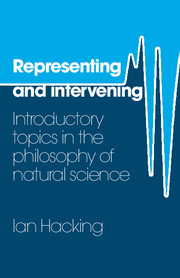Book contents
- Frontmatter
- Acknowledgements
- Contents
- Analytical table of contents
- Preface
- Introduction: Rationality
- Part A Representing
- 1 What is scientific realism?
- 2 Building and causing
- 3 Positivism
- 4 Pragmatism
- 5 Incommensurability
- 6 Reference
- 7 Internal realism
- 8 A surrogate for truth
- Break: Reals and representations
- Part B Intervening
- Further reading
- Index
- Frontmatter
- Acknowledgements
- Contents
- Analytical table of contents
- Preface
- Introduction: Rationality
- Part A Representing
- 1 What is scientific realism?
- 2 Building and causing
- 3 Positivism
- 4 Pragmatism
- 5 Incommensurability
- 6 Reference
- 7 Internal realism
- 8 A surrogate for truth
- Break: Reals and representations
- Part B Intervening
- Further reading
- Index
Summary
Why is so shop-soiled a topic as scientific realism once again prominent in the philosophy of science? Realism fought a great battle when Copernican and Ptolemaic world views were at issue long ago. Towards the end of the nineteenth century worries about atomism strongly contributed to anti-realism among philosophers of science. Is there a comparable scientific issue today? Maybe. One way to understand quantum mechanics is to take an idealist line. Some people argue that human observation plays an integral role in the very nature of a physical system, so that the system changes simply when it is measured. Talk of ‘the measurement problem in quantum mechanics’, the ‘ignorance interpretation’, and ‘the collapse of the wave packet’ make it no accident that contributions to the philosophy of quantum mechanics play an important part in the writings of the more original figures in the realist debate. A number of the ideas of Hilary Putnam, Bas van Fraassen or Nancy Cartwright seem to result from taking quantum mechanics as the model of all science.
Conversely, numerous physicists wax philosophical. Bernard d'Espagnat has made one of the most important recent contributions to a new realism. He is partly motivated by the dissolution, in some parts of modern physics, of old realist concepts such as matter and entity. He is especially driven by some recent results, that bear the general name of Bell's inequality, and which have been thought to call in question concepts as various as logic, the temporal order of causation, and action at a distance.
Information
- Type
- Chapter
- Information
- Representing and InterveningIntroductory Topics in the Philosophy of Natural Science, pp. 65 - 74Publisher: Cambridge University PressPrint publication year: 1983
